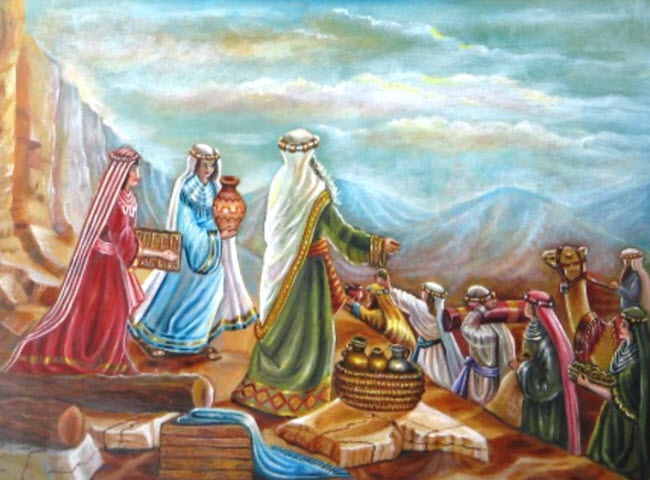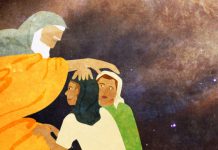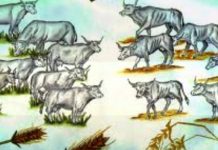Adventures of Jacob’s Return to the Land of Israel
They told him he’s on his way. “Now is my chance to get even with that despicable cheater, Jacob,” Esau thought, as he sharpened his sword for the third time. “He conned me into selling my ‘first-bornship’ while I was starving to death. Then he fooled our father into giving him my blessings. Just wait until I get my hands on him. I’ll make mincemeat out of him!”
Esau organized his 400 henchmen and rode in front of them, letting out an occasional roar to express his rage. Suddenly, as he rounded the bend, Esau almost collided with a flock of sheep. “Who are you? Who sent you here?” he demanded of the shepherd. “A present to my master Esau, from your servant Jacob,” was the humble reply. Esau, who loved receiving presents and compliments, could not help but reduce his anger. In fact, he actually managed a wry smile. “At least Jacob recognizes my superiority. At least he understands that one must ‘grease’ the wheels in order to travel,” Esau thought to himself.
The shepherd continued: “And he’s right behind us.” Those words were like a match to a gasoline tank.
Esau bellowed: “He’s behind you?! Just wait until I reach him!”
His anger kindled again, Esau rushed forward, barely stopping to sharpen his sword for the fourth time. As they rounded the next hill, Esau gazed with amazement at an entire herd of cattle. “Who are you?” he asked the shepherd, and received the exact same reply: “A present to my master Esau, from your servant Jacob.” Again, almost against his will, Esau felt his anger subsiding; he was actually feeling good as he ordered his men to take possession of the herd.
Then the shepherd said: “And Jacob is travelling behind us.” Again, Esau flew into a rage and rushed forward until he bumped into camels and donkeys, as the scenario was repeated over and over. By the time Esau actually met Jacob, his anger was totally depleted, thanks to the “psychological warfare” employed by our father Jacob. (Based on Rabbi S. R. Hirsch)
Parshat Vayishlach relates the confrontation of Jacob with a hostile gentile enemy. After successfully managing to escape the clutches of “Uncle Laban,” in this Parsha he now faces “Brother Esau” and the Prince of Shechem. The lessons we learn of Jewish survival are relevant up until today. The Talmud tells us that when the Sages had to meet Roman officials, they would review this Parsha first. One rabbi related that he forgot to review the Parsha and they cheated him out of his pants! When Menachem Begin became prime minister and went to his first official meeting with President Carter, Begin met first with the Torah Sages of America, who suggested that he look over Parshat Vayishlach!
Emissaries to Esau
“And Jacob sent emissaries to his brother Esau.” (Genesis 32:4).
The Sages criticized Jacob for this act. “If the dog is sleeping, don’t pull his tail to wake him up.” However, Jacob did not feel right sneaking into the land behind his brother’s back, and wanted to confront him. Jacob called Esau “my master” to show humility. The first lesson: In confronting your enemy, there are times to be humble!
“I lived with Laban.” (Genesis 32:5)
The Sages comment that the letters of the word “lived” (garti) contain the same letters as 613 (taryag). In effect, Jacob was saying, “Even though I lived in the house of the wicked Laban, I was still careful to keep the 613 Mitzvot.”
Question: Why should Esau care whether Jacob kept the Mitzvot or not?
Answer: Jacob informed Esau that he owned cattle and sheep and servants, to impress upon him that Isaac’s blessings were not fulfilled. Jacob did not receive “the dew of Heaven and fat of the earth” which implies agriculture. In which case Esau might infer, “Maybe the reason the blessings were not fulfilled was because you didn’t keep the Mitzvot, in which case I’m on top!” Therefore Jacob stressed, “I kept 613 Mitzvot – and still only have sheep and cattle, not agriculture. The blessings that you are jealous of were not fulfilled anyway. In which case, let’s be friends!”
Military Tactics
When informed that Esau was coming with 400 men, Jacob was afraid (that he might die) and concerned (that he might have to kill). So he divided his camp into two; in case one was attacked, the other would escape.
We can learn military tactics from Jacob: “Dividing the camp” has been the survival strategy of the Jewish people since Haman decreed the murder of the entire Jewish people. Persia was the last kingdom that ruled over the world and consequently contained the entire Jewish nation. Since that time, Jews have been scattered throughout the globe, and if one camp was attacked, the rest of the nation survived.
Money Talks
After Jacob’s military preparations, came a fat bribe. This was also a survival strategy of Jews throughout history. The Montefiores and Rothschilds, with a little gift here and there, were able to prevent violent pogroms, thereby saving countless Jewish lives.
Jacob sent Esau a huge bribe of cattle and livestock. He divided it into separate camps with space in between, and had each leader give the same message to Esau: “You are my master. I am your servant. Please take my offering.” This psychological warfare worked beautifully.
Prayer
Jacob’s final and most important tactic was prayer. Judaism believes that God runs the show and controls the world, yet we live in a world of action and may not depend only on prayer. We must take action to provide for our needs. We take medicine when ill, make the effort to find a spouse and a job, and protect ourselves from our enemies – yet still believe that all comes from the Almighty!
How does one retain this awareness? In addition to actions, one must also pray. Prayer bridges physical efforts with the spiritual belief that God really runs the world. God desires us to both make an effort and to trust in Him. The combination is formidable.
The Three Questions
Esau asked Jacob’s servants three questions: (1) “To whom are you?” (2) “Where are you going?” (3) “To whom are these before you?”
These are similar to the three questions listed in the Talmud that every person should ask himself: (1) From where did you come? (2) To where are you going? and (3) Before whom will you have to give an account?
Every human being originates from a drop of semen. We all will end up as worm food in the grave. And in the end, we will have to give an accounting of our lives before the Almighty. If one contemplates these points, he will never come to transgress. (Ethics of the Fathers 3:1)
Jacob’s men replied to Esau: “We belong to Jacob, your servant.” The lesson for us is that if we connect ourselves to the Jewish people, the children of Jacob, God’s servant, we will have the proper perspective on these questions.
The Wrestling Match
Jacob helped his family cross over the river, and then he remained alone on the other side. The Sages say that he returned for a few small pots and pans he had forgotten. The lesson here is that even though Jacob was rich, he appreciated each of his possessions and would not lose them negligently. (Don’t forget your umbrella at the library!)
Jacob met a man and had a wrestling match until the morning. The Sages explain that this was the guardian angel of Esau. Though the angel could not defeat Jacob, he did succeed in damaging Jacob’s sciatic nerve (Gid Hanashe), the sinew that holds up the leg muscle. (In remembrance of this, Jews do not eat the sciatic nerve of any animals.)
The Chafetz Chaim explains the symbolism: The Yetzer Hara (evil inclination) is the angel that man must constantly battle. The Yetzer Hara tried to get Jacob to stop learning Torah and failed miserably. He then went for the supporters of Torah and induced them to invest their money elsewhere, and there he succeeded.
The angel begged Jacob to let him go, as the morning was approaching. Jacob insisted that the angel bless him. The angel predicted that God would change Jacob’s name to “Israel,” which implies that he overcame an angel, and the guardian angel of Esau would then confirm his blessing.
Question: Why did the angel have to go in the morning?
Answer: To sing the praises of the Almighty in Heaven. When an angel fulfills its mission, it sings the praise of the Almighty. We think the Yetzer Hara wins when it gets us to transgress. In actuality, it wants us to overcome the temptation. When Jacob refused to give in to the Yetzer Hara, its mission was fulfilled, and it was time to go.
The Brothers Meet
After being softened up by Jacob’s psychological warfare, Esau and Jacob came face-to-face. Jacob exhibited total humility by bowing to the ground 7 times. Esau was so taken by this gesture that he ran to his brother and they embraced.
“He kissed him and cried.” (Genesis 23:4)
In a Torah scroll, dots appears over the word “kissed.” Some say this implies that the kisses were not sincere. Others claim they show that although it is well known that Esau hated his brother, on this occasion he actually kissed Jacob sincerely.
The Midrash presents a different idea: When they kissed, Esau tried to bite Jacob, but God protected Jacob and turned his neck into marble, causing Esau to break his teeth. This would explain why Esau cried! (And perhaps the dots are Esau’s broken teeth…)
A Family Affair
Jacob presented his family to Esau. First he introduced the maidservants and their sons, and they bowed down (grammatically in the feminine form). Then he presented Leah and her sons, and they bowed down (grammatically in the masculine form), and finally Joseph and Rachel.
The commentaries explain that Jacob wanted to impress Esau with his humility. He was aware that his wives would have a difficult time showing subservience to Esau, as they were aware of the evil that Esau represented. Therefore, Jacob first introduced the maidservants, who had no problem bowing down. Leah would not submit herself before Esau, and only the sons bowed down (hence the masculine form). Regarding Rachel, Joseph is mentioned first because he wanted to shield his beautiful mother from the eyes of wicked Esau. Joseph stood in front of her, all stretched out. But Rachel was concerned that Esau would take offense, so she took hold of Joseph, and they bowed down together.
The Camp of Angels
Esau asked Jacob, “Who were all those camps that I passed?” Jacob replied, “To find favor in your eyes.” (Genesis 33:8)
The Midrash depicts camps of angels who attacked Esau and beat him up. His men screamed, “Stop! He’s a grandson of Abraham!” but to no avail. They then tried “Stop! He’s a son of Isaac!” but also to no avail. Finally they tried “Stop! He’s a brother of Jacob!” At which point the angels stopped and proclaimed, “If so, he is one of ours.”(Rashi)
This scenario repeated itself several times, until Esau finally limped into Jacob’s camp with crutches and casts all over his body!
Satisfied With One’s Lot
Esau said, “I have plenty, my brother. Keep what is yours.” (Genesis 33:9)
The Sages say at this point Esau conceded the first-bornship and blessings to Jacob.
Jacob replied, “I have all” (Genesis 33:11), meaning “I have everything that I need.” This teaches an important lesson: A person must be satisfied with his lot, or else he will spend his entire lifetime “keeping up to the Cohens’s!” Esau said, “I have much; I’ve got a whole bunch! I’ve got loads! But I still want a lot more!”
The Talmud (Ethics of the Fathers 4:1) defines a rich person as one who is satisfied with his lot. To paraphrase: “Want what you have, and you will have what you want. Want what you don’t have, and you will never have what you want!”
Esau’s Companionship
At this point, Esau offered to travel together with Jacob. Jacob politely refused, saying, “The children are weak, and the cattle are liable to die if we hurry them” (Genesis 33:13). Jacob offered to meet Esau at a later time in Sair, where Esau lived. Of course, he never kept this appointment. Jacob realized that to do so would compromise the education of his children, who were very impressionable. They could not be buddies with Esau.
This is the opposite of the “modern” approach. Too often, when secular society embraces the Jews and invite them to join in their culture, the modern Jew trips over his feet trying to impress them. This opens the door to assimilation. We see that our forefather Jacob, when presented with such an opportunity, politely demurs and was able to bring up his children with a different, distinctly Jewish view of life.
Where Was Dina?
We don’t find Dina mentioned at the meeting with Esau. The Sages say that Jacob hid her in a box, so Esau wouldn’t set his eyes upon her. This was considered a mistake because maybe Dina would have become his wife and have a positive influence upon Esau.
Some commentators explain this not in the literal manner. Obviously, Jacob could not risk having his daughter marry his wicked brother, but the Sages are criticizing his attitude. Instead of crying to himself as he closed the box, “What a shame my brother isn’t worthy of my daughter!”, he slammed the box shut thinking “He’s not getting Dina!” For that Jacob was punished.
Abduction of Dina
Jacob entered the Land of Israel and camped outside the city of Shechem. He bought a field there (the second acquisition of land in Israel by the patriarchs) from the mayor named Chamor (literally “donkey”).
“Dina went out to see the girls of the land” (Genesis 34:1).
Although this was not the nature of a woman, Dina was originally programmed to be a boy (see Parshas Vayetzei). She followed her righteous mother Leah’s example of “going out” for a good purpose (see Genesis 30:16). We can assume that Dina’s goal was to reach out to the women of Shechem and teach them about God.
Shechem the son of Chamor also went out to see the girls, and when he found Dina among them he raped and abducted her. This was a total violation of the Noachide Law forbidding theft in any form. The entire city was obligated to enforce justice.
Shechem fell madly in love with Dina (obviously not reciprocated by her) and sent his father Chamor to demand her hand in marriage. Jacob should have turned to the local justice system to obtain his daughter’s freedom, however he was convinced from the start that they would never convict the mayor’s son! The only recourse was physical force, which he wisely left for his sons.
When the brothers heard the news they were enraged. They said: “Such an act should not be done” (Genesis 34:7) in general, and certainly not to the daughter of Jacob, an honorable man.
Shechem and Chamor offered a lot of money, and suggested that they merge into one nation and marry each others’ daughters. This sounded like a noble offer, but of course we must take into consideration the fact that Dina was still a prisoner. If they had returned her and asked her hand in marriage, it might have been different. By keeping her hostage, they demonstrated insincerity, and their noble words only served to cover up the barefaced act of rape and kidnapping.
Therefore, the sons of Jacob were justified in using any means necessary to free their sister. Dina was held hostage, so the brothers couldn’t simply politely refuse the mayor’s offer. They claimed the family had an aversion to uncircumcised men, so in order to merge, all of Shechem’s citizens would have to be circumcised as well. The brothers assumed that their offer would be refused, which would give them a pretext to demand their sister and leave.
But they underestimated the strong desire of Shechem for Dina, and the power that the mayor’s family held over the poor serfs. Shechem and Chamor convinced the entire male population to become circumcised.
On the third day, when the people were in the most pain from the surgery, the brothers overheard them swearing, “Just wait until we heal, we’ll kill those Jews for this!” (Midrash) Technically the entire city was guilty of accomplice to kidnapping, and by not judging the perpetrators, they were deserving of the death penalty themselves. Shimon and Levi, who felt their sister’s agony, stealthily entered the city. They immediately freed Dina, then killed the men. The sons of Jacob looted the city. This was intended to be a lesson to the world.
Jacob was very upset with their deed. He felt they were putting the future of the Jewish people into jeopardy, and acting solely out of anger. Even years later on his deathbed, instead of blessing Shimon and Levi, he cursed their anger.
The reply of the brothers was, “Shall our sister be as a harlot?” (Genesis 34:31). Shechem would not have done this to one of their own citizens, so it is only because she is a stranger, a Jew, that they felt free to act in this manner. We must teach the world that Jews are not open targets. (Rabbi Hirsch, Ohr Hachaim)
This story compliments the beginning of the Parsha, where Jacob deals with a hostile Esau. In dealing with adversaries, we try to show humility and use bribery when necessary. However, there are times when we must take a stand for Jewish pride and not allow them to go too far. (These boundaries here are not clear-cut, and rabbinical guidance is essential to know how to act in any given situation.)
The Death of Rachel
As Jacob began his final trip home, Rachel went into labor on the road and gave birth to the final tribe of Israel. Rachel had a life-threatening childbirth, and as the baby emerged, the midwife announced, “Be not afraid, as this is also your son” (Genesis 35:17), meaning that your mission to create the Twelve Tribes has been accomplished.
As Rachel felt herself dying, she named her child “the son of my pain.” His father Jacob, however, immediately changed his name to Benyamin (the son of my right hand).
Jacob buried Rachel on the road leading to Bethlehem, not even taking her to the closest village. The reason for this was that in the future, when the Jews would be exiled to Babylonia, they would pass by this road and be comforted by the grave of Mother Rachel. The prophet Jeremiah foresaw Rachel arising from her grave and crying bitter tears for her children, until the Almighty promises her they will return to their borders.
Jacob made a monument on the grave of Rachel, which is still visited until today. The commentators point out that it was only a monument to know exactly where her grave is, but not a monument for Rachel herself. The idea is that righteous people’s lives and accomplishments are their “monuments,” not the stone tablets over their remains!
Home at Last
Jacob finally returned home to Isaac, his father. Isaac died at the age of 180 as the Torah records. Esau and Jacob buried him.
The death of Rebecca is not mentioned. Isaac was blind in the tent and incapable of officiating at her funeral. Jacob was away from home. Had the only family member at the funeral been Esau, it would not have been honorable to the righteous Rebecca. The servants, therefore, kept her death a secret and buried her quickly, before Esau could hear the news. Since they kept it secret, the Torah does not disclose it as well.
credit to aish.com
Shabbat Shalom !













